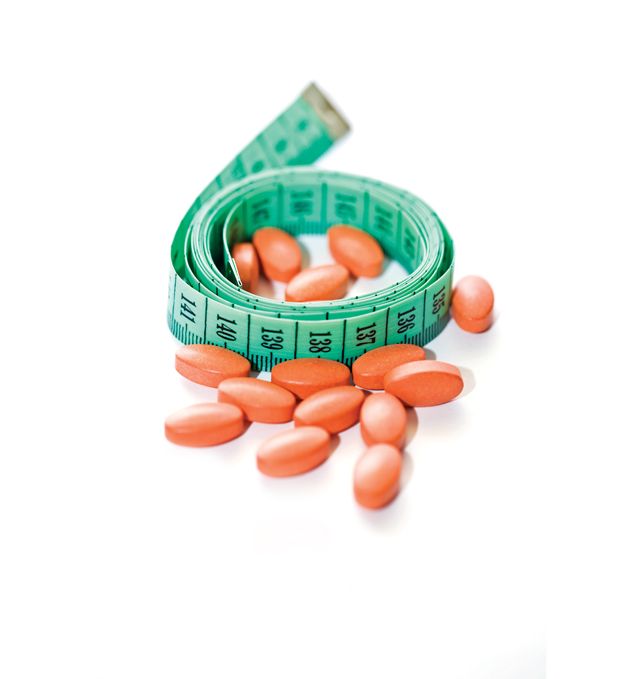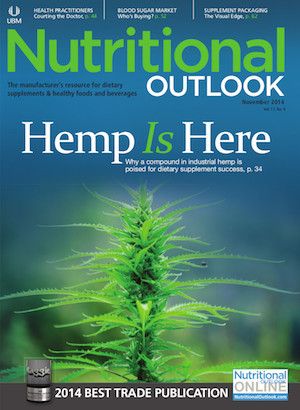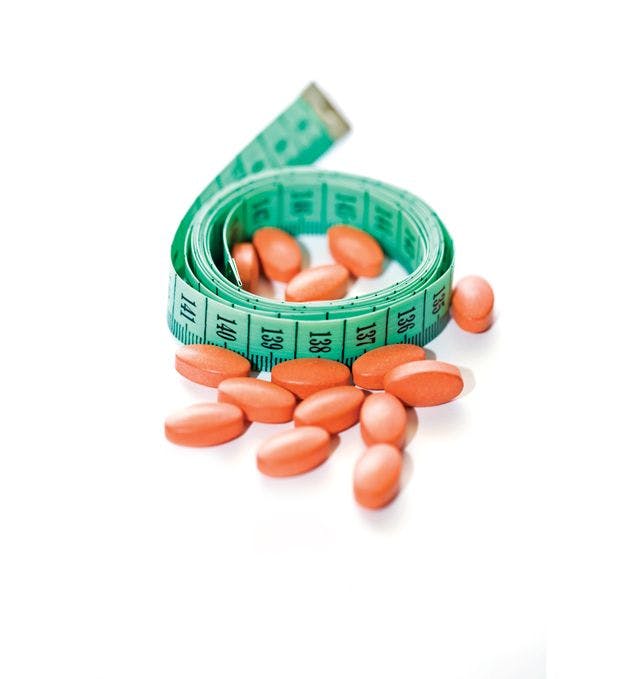More FTC Heat on Weight-Loss Dietary Supplements?
Appearing with some frequency are consent orders requiring at least two well-designed randomized controlled clinical trials (RCT).

When the FTC released updated guidelines for sussing out fraudulent weight-loss claims in print, television, and radio ads in early 2014, the agency asked media outlets to do a “gut check” before running dubious product spots. But for supplement makers in the busy weight-management space, the move felt like more of a gut punch.
After all, FTC’s “Gut Check” initiative-which singles out specious weight-loss claims for special media scrutiny-represents only one of several roadblocks that tripped up a supplements sector valued at some $60.5 billion in 2013, according to Marketdata Enterprises Inc.
Consider, for example, the settlement FTC reached with four weight-loss product marketers in January 2014 wherein the companies-Sensa, L’Occitane, HCG Diet Direct, and LeanSpa LLC-agreed to collectively refund $34 million to consumers for making what the Commission says were deceptive claims. Or consider the June Senate subcommittee hearing on consumer protection that lambasted television personality Dr. Mehmet Oz for touting as “magic” and “miraculous” weight-loss supplements like green coffee bean extract, Garcinia cambogia, and raspberry ketones that critics claim lack sufficient science-let alone magic or divine intervention-to justify their promises.
Perhaps the capstone was comedian John Oliver’s spoof of that very hearing, in which he spared no one-not the celebrity doctor, the government, nor industry as a whole-his wit. As Council for Responsible Nutrition (CRN; Washington, DC) president and CEO Steve Mister-who himself testified at the hearing-says, “Satire is not your friend in that situation. So I wouldn’t be surprised if it affected consumer confidence in the weight-loss category.”
But it hardly killed it. With more than two-thirds of American adults overweight or obese, according to National Health and Nutrition Examination Survey (NHANES) data, demand for weight-management supplements is in no existential danger. And with research on ingredients continuing apace, there’s reason for both consumers and industry to have hope. The trick to maintaining this momentum will be to keep an eye on the science and steer clear of the wild claims that attracted negative attention in the first place.
In the Crosshairs
Industry watchers agree: the weight-control sector is under increasing regulatory scrutiny. Looking back over the past few years, Mister concedes, “Yes, we are seeing more cases and more investigations focused on weight management.”
John E. Villafranco, partner, Kelley Drye & Warren LLP (Washington, DC), sees a similar pattern. “At this point, the FTC appears to be active and back to a more usual pace in announcing cases on health-related advertising-and weight-loss advertising, in particular,” he says, noting several recent “gut check” settlements whose FTC consent orders included permanent bans. “The bans either prohibit certain types of claims or prohibit individuals or companies from participating in the weight-loss industry at all,” he says. “And while bans are nothing new, there seems to have been an uptick in the use of bans recently.”
Also appearing with some frequency are consent orders barring companies from making weight-loss claims without the support of at least two well-designed randomized controlled clinical trials (RCT). This two-RCT requirement “pervades all of the FTC actions these days,” Mister says, and is “not limited to weight management.” Overlaying a “drug-like” benchmark atop the Dietary Supplement Health and Education Act’s (DSHEA) more flexible standard for competent and reliable scientific evidence, the two-RCT requirement has some in industry wondering if we’re witnessing regulatory mission creep.
Silver Linings
But Mister isn’t especially concerned about the requirement’s effect on the weight-management category in particular, and the reason why underscores once again that weight management, despite the recent kerfuffle, is in a healthy spot.
As Mister points out, “Weight management is an area where you can do a 60-day, even a six-month trial with human subjects.” While such studies require rigorous design, execution, and data interpretation, they are, he says, “relatively easy to set up. And that’s why I think if you talk to those we’d consider experts on weight management, they would probably not think it unreasonable for a company making these claims to do clinical trials on these products.”
And if the products perform as hypothesized, that news will only buttress any claims and redound to the good of the category as a whole. As Villafranco sees it, if FTC applies its consent-order authority justly, it “can strike the right balance to require a reasonable level of substantiation while avoiding setting the bar so high that the many existing good actors in the weight-loss industry will no longer have the incentive-or financial capability-to innovate, create, and market new products.”
And make no mistake: good actors are out there. While some weight-management claims “really are egregious,” Mister says, and the billions of dollars spent on the products rightfully has FTC cautious of fraud, “we do believe that there are legitimate ingredients in the dietary supplement space that can help consumers with weight management, whether by increasing metabolism, providing a sense of satiety, or providing other benefits,” he says.
Word to the Wise
That’s why CRN “applauded” FTC’s activities in its June testimony before Congress and “encouraged them to do even more in this area,” Mister continues. “It does a real disservice to legitimate marketers of legitimate ingredients when you have people out there promoting ingredients that simply cannot work the way they’re being advertised.”
So what’s his advice to legitimate marketers hoping to remain within FTC’s good graces? Mister has a checklist of best practices, starting with the exercise of assiduous ingredient oversight. As he explains, simply by being in the weight-management space, product formulations are already in the crosshairs. That makes it imperative “that you’re doing really good analysis on your incoming ingredients to make sure that what you think you’re putting in your products is actually what you’re putting in them,” he says.
And as strictly as you scrutinize your ingredient certs, scrutinize your science. Ask yourself: Is it, in fact, “competent and reliable” evidence? Do the data cover human subjects? And what about dosing? “If the daily serving I’m recommending is 12 mg and the studies are all done using 100 mg, it becomes hard to say that the evidence supports use of the product,” Mister says. “So make sure there’s a good, strong link between the study and the product in terms of ingredients and levels.”
And mind the messenger, particularly if you’re leaning on testimonials or endorsements. For example, Mister says, “If five people who’ve lost five pounds in 30 days are going to become spokesmen for your product, the FTC says that you need to show that their results are typical of what the average consumer can expect.” And in accordance with FTC’s Operation Full Disclosure initiative, launched in September, you’ve got to disclose that information clearly and conspicuously-not in mouse type on the insert’s back page.
That done, you can breathe easier when it comes to crafting product claims. Nevertheless, Mister urges marketers to avoid FTC’s “red flags”-claims so suspicious that their very presence should prompt that aforementioned “gut check.” Any promise that a product will help users shed 2 lbs or more per week for a month or beyond without diet or exercise should set off bells. So, too, should promises of substantial weight loss regardless of diet; products that purport to block the absorption of fat or calories; claims of a safe loss of more than 3 lbs per week for more than a month; products that promise all users will lose substantial weight; promises of weight loss via topical application; and any promise of permanent weight loss. Nothing, after all, is permanent.
“Companies in this space should absolutely look at those areas and make sure they steer clear of them,” Mister says. It doesn’t hurt to lawyer up, either. As he sagely advises, “It’s always a good idea to get outside counsel to review your labeling and claims in advertising.”
Sidebar:
Turning Up the Heat: Thermogenic Innovations
Congressional hearings and FTC scrutiny notwithstanding, this really is an exciting time to be exploring the weight-management landscape. For proof, look no further than the innovations sweeping thermogenics. As Bob Green, chairman, Advantra Z Inc. (West Caldwell, NJ), puts it, “We’re very confident in the future of the thermogenic market because manufacturers have only begun to tap the potential of thermogenic ingredients.” Stimulating the body’s thermogenic potential “is a proven method of not only weight loss, but also for increasing fitness and energy,” Green says. And if an ingredient can do that without negative side effects, “the opportunities for innovative consumer products are limitless.” Start exploring right here:
Advantra Z
Green points to two large, long-term human clinical trials as vindicating his company’s Advantra Z bitter orange extract (Citrus aurantium) as a safe and effective thermogenic ingredient. A randomized, placebo-controlled, parallel-group, double-blind study published in 2013 in the Journal of the International Society of Sports Nutrition1 found that eight weeks of supplementation with a multi-ingredient weight-loss supplement (Prograde Metabolism) containing Advantra Z-along with raspberry ketone, caffeine anhydrous, OmniActive Health Technologies’ (Morristown, NJ) capsaicinoids ingredient Capsimax, and others-enhanced body composition, reduced hip and waist girth, and increased energy levels in overweight men and women when administered as part of a weight-loss program including caloric restriction and exercise.
Another study, published in 2013 in Food Chemistry Toxicology2, found that Advantra Z and its dominant amine p-synephrine produced no adverse effects on systolic or diastolic blood pressure, blood chemistry, or blood cell counts, nor any adverse effects on cardiovascular, hepatic, renal, or hemopoietic system function at a dose of up to 98 mg daily for 60 days. Of note, Green says, this was “the longest research study with the highest dose of bitter orange as a single-entity product conducted to date.”
ActivAMP
One strategy for boosting thermogenesis is to get out and exercise, which acts on the enzyme 5’ adenosine monophosphate-activated protein kinase-AMPK, for short-to, broadly speaking, “determine whether available energy is utilized to meet immediate requirements or stored for future use,” explains Paul Clayton, PhD, chief scientific advisor, Gencor (Irvine, CA). “Activated AMPK also increases fat burning via beta oxidation and inhibits cholesterol synthesis by down-regulating HMG CoA reductase and fat formation by down-regulating acetyl CoA carboxylase.”
Exercise being easier said than done, the possibility that a thermogenic ingredient could trigger a similar cascade of cellular activity is tantalizing. According to a 12-week randomized, double-blind, placebo-controlled trial of 80 overweight participants published in 2014 in Obesity3, it appears that Gencor’s ActivAMP, an extract of the herb Gynostemma pentaphyllum, may do just that. Study results showed statistically significant decreases in body-fat mass, percent body fat, body weight, body-mass index (BMI), and total abdominal fat area in the experimental compared to the placebo group.
“AMPK is often called the ‘master metabolic regulator,’” Clayton notes, “and it switches on the same fat-burning and energy-producing metabolic processes that exercise does.” It appears that the actives in the Gynostemma extract, a class of saponin compounds called damulins, account for the supplement’s AMPK activation.
Coleus Extract
According to Anurag Pande, PhD, vice president, scientific affairs, Sabinsa Corp. (East Windsor, NJ), “For better success of long-term weight-loss maintenance, one has to understand the various factors affecting it. One prime factor resulting in poor long-term weight-loss maintenance is an adaptive decrease in thermogenesis.”
That is, the less caloric energy one consumes in pursuit of weight reduction, the more the body adapts to the energy deficit by reducing its energy needs and expenditures. “One way to overcome this adaptive decrease is to stimulate thermogenesis,” Pande continues. He notes that clinical studies demonstrate the benefits of Coleus forskohlii extracts in maintaining long-term weight loss via thermogenic enhancement.
Forskolin, a diterpene that’s a key active in Coleus extracts, “stimulates the enzyme adenylyl cyclase and subsequently increases levels of cyclic AMP, or cAMP,” Pande explains. In adipose tissue, cyclic AMP helps release fatty acids, “facilitating fat breakdown in adipose tissue,” he says. In so doing, “cAMP may actually regulate the body’s thermogenic response to food, increase the body’s basic metabolic rate, and increase utilization of body fat.” Not bad for an herbal extract.
Sinetrol
At Fytexia, in Vendres, France, they’re betting that the famously healthful Mediterranean diet bears some responsibility for the region’s famously slender inhabitants. “If you go to the South of France and ask people how they stay lean and healthy,” notes Romain Thévenot, sales manager at Fytexia, “they will tell you about their well-balanced diet based on multiple fruits and vegetables.”
Those fruits and veggies are packed with polyphenolic antioxidants, and Fytexia developed its Sinetrol XPur product to capture their potential to promote weight management. It is a proprietary combination of citrus extracts from specific varieties of blood orange (Citrus sinensis L.), sweet orange (Citrus sinensis L.), grapefruit (Citrus paradisi Macfad), and guarana (Paulinia cupanna Kunth), with a total polyphenol content of 90%.
Thévenot notes two published clinicals showing that the product promotes lipolysis by inhibiting phosphodiesterase, “helping [users] lose fat without any controversy about safety.” More specifically, flavonoids like naringin, abundant in both in grapefruit and the Sinetrol extract, induce the expression of fatty acid–oxidation genes that help the body use free fatty acids for energy, he says.
In the more recent of the two studies, a 12-week randomized, double-blind, placebo-controlled human intervention trial published in 2013 in Phytotherapy Research4, subjects who took the extract twice daily with meals exhibited significantly decreased body weight, fat mass, and waist and hip circumferences compared to the placebo group. The release of free fatty acids into plasma was also significantly higher in the treatment group, further supporting the extract’s proposed lipolytic mechanism.
References
- Lopez HL et al., “Eight weeks of supplementation with a multi-ingredient weight loss product enhances body composition, reduces hip and waist girth, and increases energy levels in overweight men and women,” Journal of the International Society of Sports Nutrition, vol. 10, no. 1 (April 19, 2013): 22
- Kaats GR et al., “A 60day double-blind, placebo-controlled safety study involving Citrus aurantium (bitter orange) extract,” Food and Chemical Toxicology, vol. 55: 358-362
- Park SH et al., “Antiobesity effect of Gynostemma pentaphyllum extract (actiponin): A randomized, double-blind, placebo-controlled trial,” Obesity, vol. 22, no. 1 (January 2014): 63-71
- Dallas C et all, “Clinical study to assess the efficacy and safety of a citrus polyphenolic extract of red orange, grapefruit, and orange (Sinetrol-XPur) on weight management and metabolic parameters in healthy overweight individuals,” Phytotherapy, vol. 28, no. 2 (February 2014): 212-218
Photo © iStockphoto.com/Materio

HHS announces restructuring plans to consolidate divisions and downsize workforce
Published: March 27th 2025 | Updated: March 27th 2025According to the announcement, the restructuring will save taxpayers $1.8 billion per year by reducing the workforce by 10,000 full-time employees and consolidating the department’s 28 divisions into 15 new divisions.



















